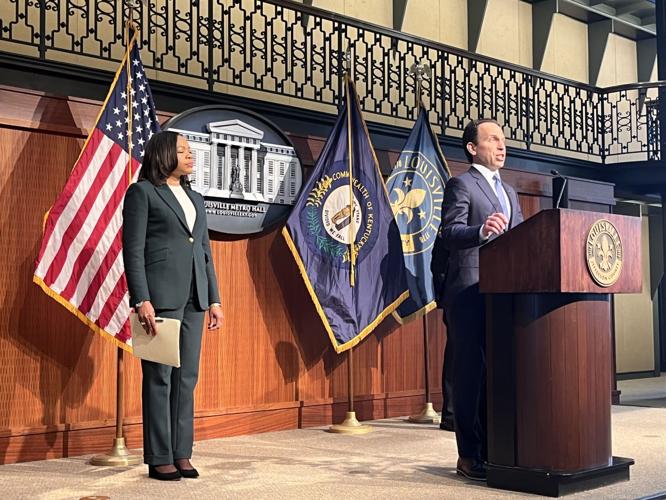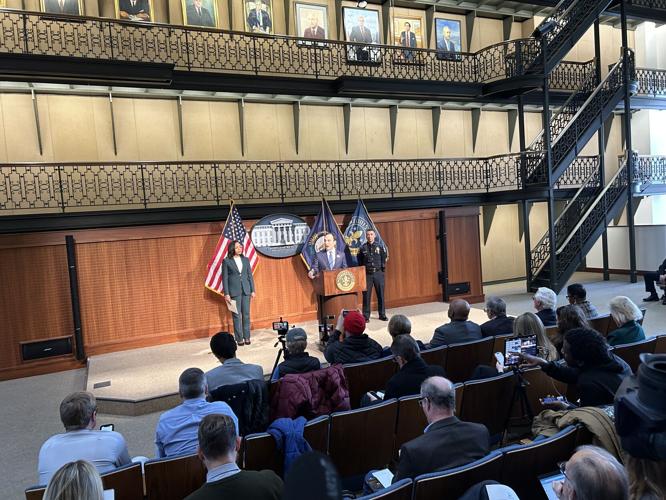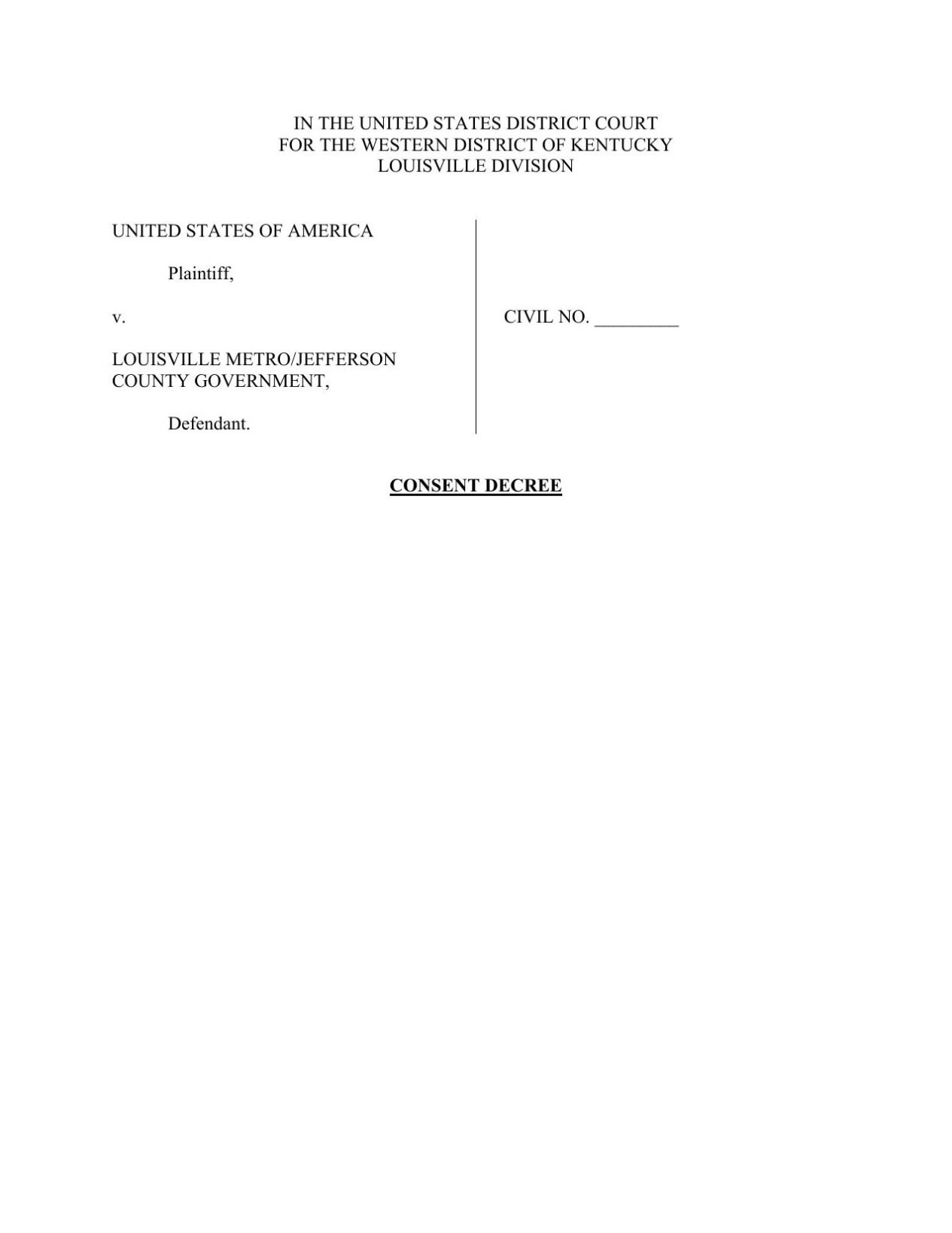LOUISVILLE, Ky. (WDRB) -- Louisville Metro government and the U.S. Department of Justice agreed to a legally binding deal to reform the city's police department, which federal investigators have accused of illegal and unconstitutional practices.
Mayor Craig Greenberg's administration expects the agreement -- called a consent decree -- will be approved by a federal judge, starting a process city officials hope will be completed in less than five years. An independent monitor who reports to the court will oversee the police department's progress.
The 248-page document is the result of months of negotiations that began after the Justice Department concluded in 2023 that Louisville police and Metro government for years engaged in practices that violated the U.S. Constitution and federal law, including excessive use of force and searches based on invalid warrants.
Greenberg, Assistant Attorney General Kristen Clarke and Louisville Metro Police Chief Paul Humphrey announced the agreement Thursday at Metro Hall. The mayor hailed it as a "historic" pact that will "build upon and accelerate" changes already begun in LMPD.
"We are already well on our way to implementing" many of the reforms ordered by the DOJ, Greenberg said. "This consent decree will ensure our officers are committed to protecting the constitutional rights of residents while improving public safety and preventing violent crime for our entire community."
The city plans to name the monitor— typically a team of experts in policing, law and other specialties — by the spring. It has agreed to pay no more than $1.475 million annually for an initial two-year term. After five years, a U.S. District Court judge will hold a hearing on Louisville's progress.
Under the agreement, the department will revise its use-of-force and training policies, improve search warrant practices, ensure traffic stops are conducted legally, ensure the fair investigations of police misconduct and address sexual harassment allegations in the department, among other reforms.
Consent decrees have a track record of reducing officers' use of force and the number of complaints and lawsuits against them, according to media reports. Given the actions the city and LMPD have already taken, Clarke said she felt confident the federal oversight could be completed within five years.
"We recognize and credit the steps the police department have already taken," she said. "Louisville has not stood by idly."
In fact, city officials say LMPD's work to enact new policies and other changes explains why Louisville's cost is less than in other places with similar agreements. In short, they said, Metro government has been doing work typically the responsibility of the monitor.
The agreement addresses 13 specific areas, from traffic stops to officer assistance, and requires police to show "substantial compliance" with the promised changes before each section is satisfied.
"I believe that having an independent monitor gives us an opportunity to have the excellence of our work confirmed for the community," Humphrey said. "This has to be more than just words on page. It is a promise to our officers and our professional staff that we are going to lead them and support them the right way, without fail. It is a promise to our community that we are responsive to their needs, and we will remain committed to creating an agency that values self improvement."
As former President Donald Trump prepares his return to the White House, some people expressed concerns the decree would be scuttled if an agreement wasn't reached by the end of the year.
During Trump's first term, Attorney General Jeff Sessions raised concerns about consent decrees in a 2018 policy memo, including their impacts on budgets and local control.
Greenberg said he's committed to the reforms. "Regardless who is president, regardless of who is attorney general, we have made a commitment to the people of Louisville," he said.
Clarke did not directly answer a question about how the incoming administration may handle the Louisville consent decree.
She said the Justice Department stands with Louisville officials "on the path that we need to take to address some very severe and significant violations of law that we have uncovered. The career professionals of the Justice Department are the ones who do this work and will carry this work forward in the road ahead."
The agreement comes after the DOJ found police and Metro government for years engaged in practices that violated the U.S. Constitution and federal law, including excessive use of force and searches based on invalid search warrants.
How We Got Here
The Biden administration's Justice Department announced the findings of its review March 8, 2023. That came nearly two years after the 2020 police killing of Breonna Taylor, which prompted both local and national criticism of the police department as well as months of protests.
U.S. Attorney General Merrick Garland listed myriad examples of Louisville police misconduct and crimes, such as throwing drinks at pedestrians, racial disparities in arrests and traffic stops, assaulting citizens with disabilities and calling Black people "monkeys, animal and boy."
The oversight committee for the consent decree sets tangible requirements for change, metrics to measure improvement and timelines to achieve them. It's all approved by a federal judge and then overseen by the independent monitor.
Greenberg said there will be a "public selection process" for the independent monitor and community will be able to meet finalists before a decision is made.
Updates will be provided to the community as reforms are made, he said, promising to have an "open, transparent" police department committed to public safety.
"With all of us working together, we will reach our goal of making LMPD the best police department in America," Greenberg said.
In February, officials with the city and LMPD began negotiations with the DOJ. There were more than 60 meetings to hammer out the agreement, Greenberg said.
The federal investigation into LMPD cites 63 different incidents of alleged misconduct, according to an appendix of the 90-page report the DOJ released following their roughly two-year investigation.
The Justice Department investigation began about a year after Taylor was killed during a botched police raid.
Here is a timeline of the events that sparked the DOJ investigation into LMPD.
Police were looking for money or drugs connected with Jamarcus Glover, who was at the center of a narcotics probe by Louisville police. The warrant for Taylor's home was executed around the same time that police served other warrants on suspected drug houses in the city's west end, some 10 miles away.
Kenneth Walker was dating Taylor and was with her after midnight on March 13, 2020, when police raided her apartment on Springfield Drive near Pleasure Ridge Park. Walker, a licensed gun owner, told police he fired one shot when he believed intruders had burst into the home. Former Sgt. Jonathan Mattingly was shot once in the leg.
Police responded with 32 shots, hitting Taylor six times. The 26-year-old died at the scene.
No drugs were found in her home.
The Justice Department charged four former Louisville police officers with federal crimes in connection with the fatal raid.
A federal jury last month found former Louisville officer Brett Hankison guilty of using excessive force and violating Taylor's civil rights. He is facing a maximum sentence of life in prison.
Metro government paid $12 million to Taylor's family and implemented numerous reforms in the police department to settle a wrongful death lawsuit.
Examples of excessive force provided in the DOJ report include the use of neck restraints and police dogs against "people who pose no threat," an "unreasonable and unsafe" use of tasers, using takedowns, strikes and bodily force "disproportionate to threat or resistance," and escalating encounters, leading to excessive force.
Several police officers have been convicted of crimes in recent years.
LMPD has been sued several times for traffic stops claiming racial bias by officers, including the 2018 viral stop of then 18-year-old Tae-Ahn Lea. Lea, who is Black, was removed from his car and handcuffed for about 20 minutes after police pulled him over for making a wide turn. A lawsuit filed on Lea's behalf is pending.
And in just the last seven years or so, the city has paid more than $70 million to settle dozens of lawsuits accusing the city's police department of complaints ranging from wrongful arrests to drivers who were stopped and searched illegally.
The total since 2017 dwarfs what neighboring states and other larger cities have paid for police mistakes in recent years, a WDRB News investigation found.
Reaction to the consent decree
Among those in attendance at Metro Hall for Thursday's were local legislators, civil rights leaders and others who have pushed for police reforms.
Tamika Palmer, Breonna Taylor's mother, said Louisville has a history of "putting things on paper" that don't ultimately lead to change.
"We have to stay on top of the situation and definitely make sure that they are doing just what they say that they are doing," she said.
Palmer was in Washington D.C. in September with other families affected by police shootings and told reporters that she learned there that "consent decrees can be helpful."
"I'm hopeful ours here is helpful," she said. "Again, we just know that in Louisville we've been slow to move the needle."
The consent decree is "a splash in the bucket," said Metro Council member Shameka Parrish-Wright (D-3rd). "But the accountability--we're on a long road."
She has been an outspoken advocate both for justice for her daughter Breonna Taylor and police reform.
She said citizens must stay involved to ensure a fair process, and she called on the Greenberg administration to provide paper copies of the consent decree in city libraries.
Another Metro Council member, Jecorey Arthur (I-4th), said he's concerned that the reforms required in the consent decree will swell the police budget.
"I'm excited that somebody's finally validating all the concerns that the Black community has had for centuries in our city, but I hope that it doesn't just result in more money for them," Arthur said, referring to LMPD.
This story may be updated.
Related Stories:
- One-on-one | LMPD chief talks about former detective's conviction, police reform, public safety
- Louisville mayor's team in Washington to meet with DOJ over ongoing LMPD consent decree negotiations
- 'Very important we get this right' | Paul Humphrey sworn in as chief of Louisville police
Copyright 2024 WDRB Media. All Rights Reserved.
















